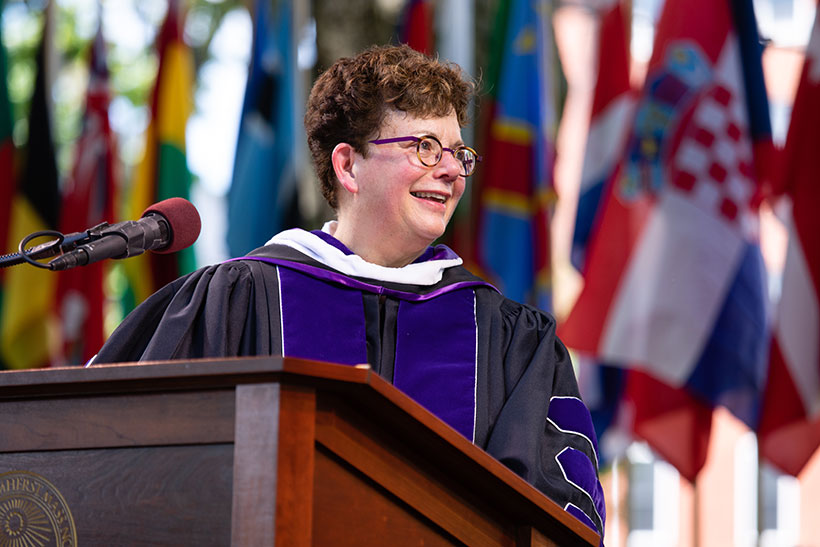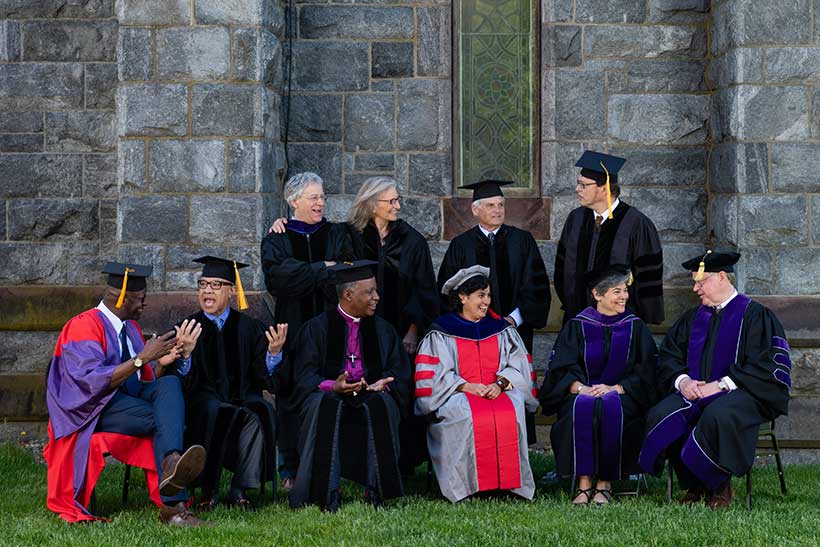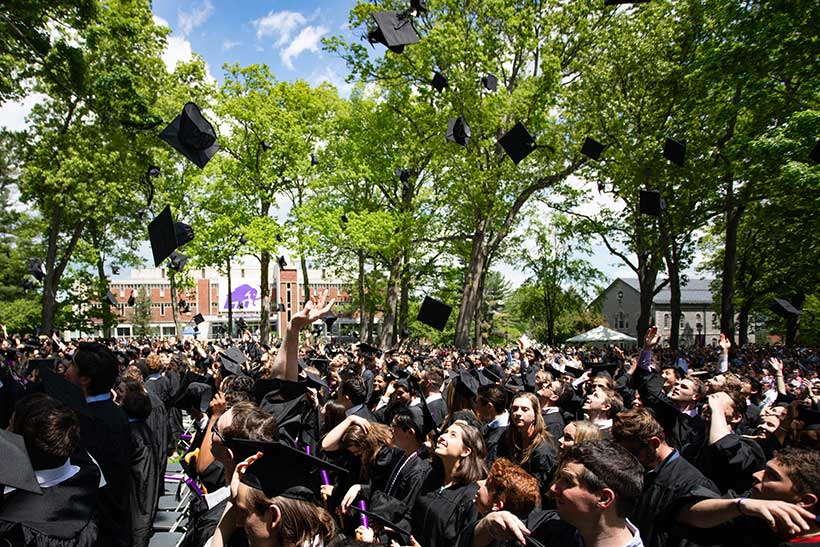Under a canopy of vibrant green leaves on the Amherst College Quad today, President Biddy Martin sent the members of the class of 2019 off into the world by urging them to do their part to “use disagreement in search of the common good, a good that acknowledges the life we share with trees.”
An estimated 5,000 family members and friends sat among the Quad’s oaks and maples as Martin spoke, and then cheered for the seniors as they received their bachelor of arts degrees. The event also featured an address by student speaker Helena Burgueño ’19, the awarding of seven honorary doctorates, and performances by the Choral Society. It concluded a weekend of lectures, concerts and other festivities. (Audio of talks given by the honorees, videos of speeches and photos from the weekend will be posted by 5/29/19 and linked to from this story.)
Martin’s use of trees as a theme was especially fitting given the day’s setting. An unseasonably rainy spring resulted in an even lusher Quad than normal, and audience members fortunate enough to be in the shade—the temperature topped out above 80—were dappled with green and yellow light filtering through the leaves above.

Martin began her address by recounting the removal of a copper beech tree in her yard. The activity took place while she was writing her Commencement address, and she found herself watching the spectacle out the window.
“I stood looking out at the tree’s great height and expanse, its deep plum-red leaves and the trunk that still gave the appearance of solidity,” she said. “I began to feel a sense of loss, the loss of what had felt like shelter.”
That the tree was a beech reminded her of another of its kind on campus—one recently planted behind Webster Hall as a memorial to Christopher Collins ’20, who died last year. “Within minutes of [the beech’s] planting in the earth, the branches began to lift and the tree seemed to raise its arms and fill out, as if on cue,” she said. That planting and a subsequent exchange with two of Collins’ baseball teammates struck a chord: “In hard times, if we clear out the debris and ignore the noise, we are reminded of the things that matter.”
Martin went on to quote from Song of Trees, in which author David Haskell writes that to “listen” to trees “is to learn how to inhabit the relationships that give life its source, substance, and beauty.”
“To learn how trees communicate, and how they protect one another by emitting chemical and other kinds of messages, is also a great lesson and a humbling one to us humans, who so readily set ourselves apart,” Martin continued. “To listen to other people, even those who think otherwise” is to learn “what gives our lives their source and beauty—our interdependence and our belonging in embodied networks.”
The president then cited Bertolt Brecht and Adrienne Rich as poets who wrote of trees as a way to make political statements about fascism and civil rights, respectively. “Today, more than in the late 1930s or mid 1970s [when the authors lived], it is necessary to talk about trees, not in order to obscure, deny or ease us into truth and dread; it is necessary, because the forests they once made up are essential to living networks, and the shelter they provide and represent is disappearing even as the numbers of persecuted human beings and extinct species seem to grow.”
She observed that she was thinking about losses in general nowadays—not only of people and trees and other species, but also of principles, rights and protections, threats to which “destroy shelter for the embodied networks of which humans are one part.”
Martin then spent several moments describing the many achievements of the class, listing specific examples.
She marveled at the graduates’ abilities in classrooms and labs, in community service and athletics, in theater, art and music. She marveled also at their commitment to “make Amherst a better place” through protest, student government, newspaper reporting and work in the College’s resource centers, as well as their determination to bring greater attention to mental health, climate change and marginalized groups, and their courage in exploring “the possibilities of discovery, truth and change,” as evidenced in their theses.
“Tension and conflict are a crucial part ... changes to networks—they work when we are willing to take risks in truth-telling and when our interlocutors or listeners are as forgiving as possible of our mistakes,” she said. “Our perspectives change by virtue of our interactions with others and with the things of this world; they change with our awareness of our interconnectedness.”
Before wrapping up the ceremony by reciting A.R. Ammons’ “Salute”—a tradition of hers for many years—she left the graduates with one last charge: “You have what you need to do well, also to create more truth, better politics and the relationships worth having,” she said. “Go out and plant trees. Remember they do not stand alone—and neither do you.”









